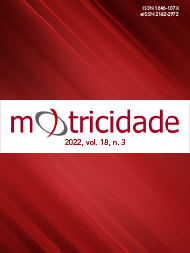Análise quantitativa e qualitativa de uma intervenção com jogos motores adaptados: Projeto “Jogamos Tudo, Brincamos Todos”
DOI:
https://doi.org/10.6063/motricidade.27088Palavras-chave:
1º CEB, Jogos, Inclusão Inversa, Atitudes de Inclusão, Perceção de CompetênciaResumo
O presente projeto piloto visa analisar o efeito de um programa de intervenção baseado em jogos lúdico-motores adaptados para as deficiências sensoriais e físicas, com a duração de 5 semanas, em crianças do 1º e 4º anos de escolaridade do 1º ciclo do Ensino Básico, ao nível da perceção das crianças sem deficiência face aos pares com deficiência, nomeadamente no que diz respeito às atitudes de inclusão e da perceção de competências. Participaram 32 alunos, dos quais 15 são do género masculino e 17 do género feminino, com idades compreendidas entre os 6 e os 10 anos. Para a avaliação da implementação deste programa de inclusão inversa, recorremos a uma metodologia mista com a avaliação quantitativa realizada através de um questionário (em processo de validação) e a avaliação qualitativa com a realização de grupos focais. Os principais resultados revelam a existência de diferenças significativas, na dimensão da perceção de competências, entre os dois momentos de avaliação (pré e pós). A análise dos grupos focais também realçou a satisfação com o programa de atividades desenvolvido e perceção da pertinência do mesmo. De uma forma geral, conclui-se que o projeto permitiu aos participantes melhorarem a perceção relativa às competências e dificuldades de uma criança com deficiência, bem como mais conhecedores de estratégias (por exemplo jogos e brincadeiras) para incluir os pares com deficiência.
Downloads
Publicado
Edição
Secção
Licença
Os autores dos manuscritos submetidos para publicação deverão ceder, a título integral e permanente, os direitos de autor (copyright) à revista Motricidade e às Edições Sílabas Didáticas. A cedência de direitos de autor permite a publicação e divulgação do artigo em formato impresso ou eletrónico e entrará em vigor a partir da data de aceitação do manuscrito. Os autores concedem, ainda, os direitos para a revista Motricidade utilizar e explorar o respetivo artigo, nomeadamente para licenciar, ceder ou vender o seu conteúdo a bases de resumos/indexação ou outras entidades.
Nos termos da licença “Creative Commons”, os autores poderão reproduzir um número razoável de exemplares para uso pessoal ou profissional, mas sem fins comerciais. Nos termos da licença SHERPA/RoMEO, os autores poderão, ainda, disponibilizar/arquivar uma cópia digital final (versão postprint) do artigo no seu website ou no repositório científico da sua instituição.


